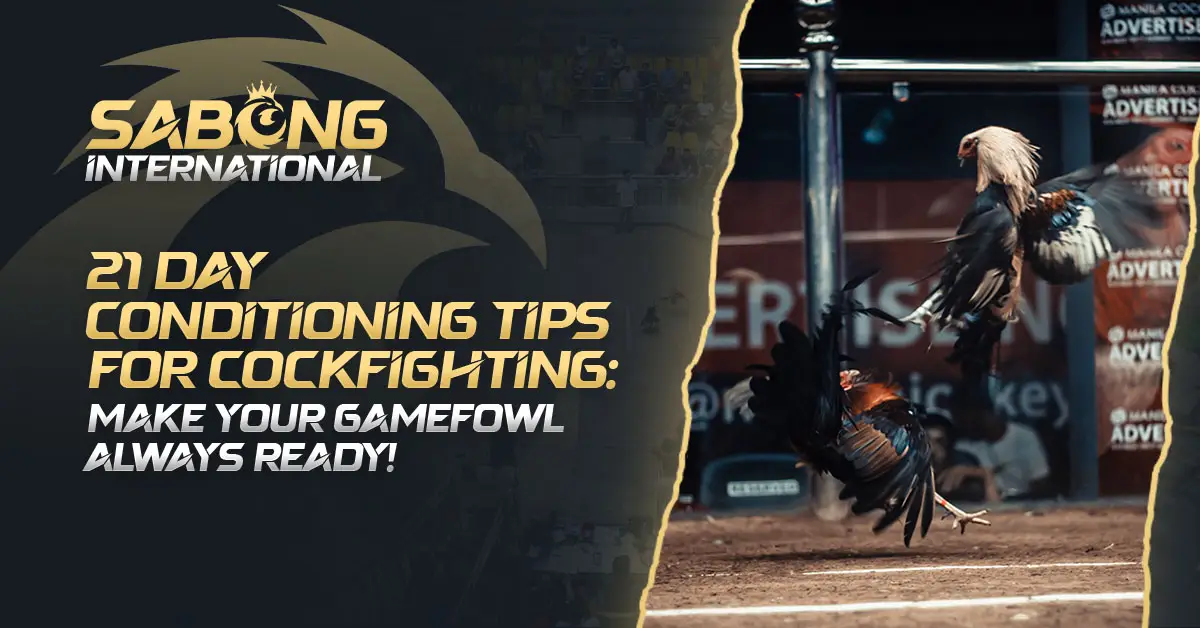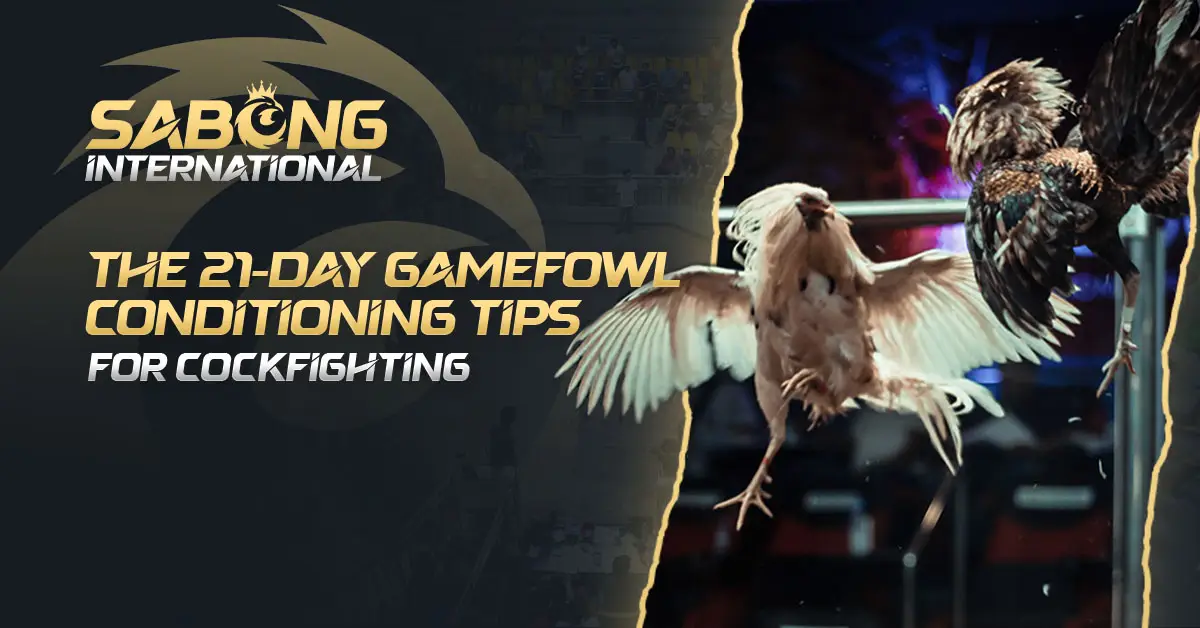21 Days Conditioning Tips For Cockfighting: Make Your Gamefowl Always Ready!

Historically, cockfighting has been a sport that shows off the strength, speed, and skill of game birds. Preparing your game birds for the ring is both a custom and a way to improve your chances of winning. In this post, we’ll look at 21-days conditioning tips for cockfighting to keep your gamefowl fighting fit.
Understanding Conditioning Tips For Cockfighting
The 21-Days Gamefowl Conditioning Tips for Cockfighting

Day 1: Deciding Which Gamefowl Will Go Through the Program
- Reddish shanks: This means the rooster is healthy and in good shape.
- A tail wag is a sign of trust.
- Quiet but vigilant
- Taking a bow or stretching
- The toes, feet, and body are just the right temperature.
- A rooster that is well-pointed and ready to fight has a fighting cock whose head knocks because it is partly dehydrated.
- Their shiny, smooth feathers show that their bodies are getting enough water.
Day 2: Deworming (Pagpupurga)
- The day before deworming, avoid feeding in the afternoon. Deworming should be done between 4 and 5 a.m.
- After administering medication, return the bird to its cage and supply fresh water.
- See whether there are any worms in the feces.
- Between 9 and 10 a.m., start them on a soft diet and resume regular feedings around 5 p.m.
Day 3: Flushing the bacteria
- Use Vetracin Gold Capsules to flush antibiotics.
- Give your bird an injection of Bexan XP Injectable, which has a high B-complex vitamin content for optimal muscle growth and improved nutrition utilization.
- Give gamefowl a medicated shampoo bath to get rid of dangerous exterior parasites.
Day 4: Injectables are Administered, and Rotation Day
- One of the conditioning tips for cockfighting is to note the weight of each bird before you start the rotation. At 4 or 5 a.m., begin rotating at the scratchbox.
- Serve breakfast at 7 a.m.
- Give an injectable B-complex plus amino acid one-hour following breakfast.
- Let birds take a nap in the cording area.
Bet on Sabong with Sabong International now!
Day 5: First Sparring Day and Rotation Day
- Continue rotating as normal.
- Give them electrolytes and oral vitamins in their water.
- Allow gamefowl to spar around 4 p.m. Note their performance and assign a grade based on it.
- After 5 p.m., feed them and let them relax.
Days 6–8: Days of Rotation
- Day 6: After the morning meal, administer oral vitamins and calcium lactate before to the perming rotation.
- Day 7: Increase their immunity by giving them multivitamins.
- Day 8: To help prevent colds, give them ascorbic acid. Give gamefowl sun exposure only between 6 and 8 a.m.
Day 9: Conditioning Tip for Cockfighting: Fasting, Second sparring day, and Rotation day
- Continue rotating as normal.
- Add electrolytes and vitamins to drinking water (AM and PM).
- Start sparring at 3:30 p.m. Note their performance and assign a grade based on it.
- Not in the afternoon to avoid deworming the next day.
Day 10: Grooming, delousing, injectable administration, and deworming
- Deworming should be done between 4 and 5 a.m.
- Apply the delousing solution to the gamefowl after breakfast. Let them air dry in the sun after washing.
- Give B-complex + amino acid injections.
- Typical mealtime is 5:00 p.m.
Day 11: Bacterial flushing and rotation
- Continue rotating as normal.
- Reconstitute the water-soluble antibiotic and give it with a fresh solution in the morning and again at midday. This is one of the best conditioning tips for cockfighting.
Days 12–14: Second Sparring Day and Rotation
- Days 12 and 14: Continue with the regular rotation.
- Day 13: Start sparring at 3:30 p.m. Note their performance and assign a grade based on it.
- To increase their immunity, give them multivitamins.
Day 15: Fourth and Final Day of Sparring
- Give the bird its morning meal and let it rest.
- Give electrolytes and vitamins orally through drinking water.
- Around 3 p.m., start sparring. Afterward, record their performance and assign a score based on it.
- Give antistress medication together with the afternoon meal.
Day 16: Delousing and Rotation Day
- Bathe thoroughly with a delousing solution after your morning feed. Let it air dry in the sun.
- At 7 a.m., give vitamins and a morning meal
- Feed and administer anti stress medication at 5 p.m.
Days 17–18: Maintenance and Carbohydrate Loading
- 6 a.m.: Limber the birds, then give them a foot bath.
- Note the weight of each and serve breakfast.
- Give injectable B-complex + amino acid one-hour following breakfast.
- After 12 p.m., let them stretch and urinate, and feed them at 5:00 p.m.
Day 19: Carb Loading and Keeping
- Tally the weight.
- Serve breakfast.
- After lunchtime, let them stretch and urinate. Give combatants permission to go for walks.
- Serve merienda with ripe bananas.
- Allow to urinate at approximately 4 p.m.
Day 20-21 (Fight Day): Maintaining and Consuming Carbohydrates
- Wash the bird’s feet and face.
- At 7 a.m., administer 20 grams of feed.
- If you’re traveling, give antistress medication.
- Let the bird urinate every one to two hours.
- Find out when the match begins to determine when the bird has to be fed again.
Final Thoughts
Sticking to these conditioning tips for cockfighting is a complex procedure that calls for commitment, education, and a thorough comprehension of the needs of the birds. You’re not only getting your gamefowl ready for the ring, but you’re also taking care of their welfare when you make use of these 21-days conditioning tips for cockfighting.
FAQs for Sabong Myths
Yes, many cockfighters actually believe that certain feathers bring their roosters good luck.
Sabong's superstitions are strongly founded in cultural and historical beliefs, and they frequently defy rational explanation.
The first crow is considered a major omen, and cockfighters interpret it as a prediction of the fate of the match.
While there is anecdotal evidence to indicate the influence of moon phases on cockfighting outcomes, scientific proof is limited.


